Cite this document
(Importance of Organisational Behaviour and Human Resource Assignment, n.d.)
Importance of Organisational Behaviour and Human Resource Assignment. Retrieved from https://studentshare.org/human-resources/1780380-organisational-behaviour-and-human-resourc
Importance of Organisational Behaviour and Human Resource Assignment. Retrieved from https://studentshare.org/human-resources/1780380-organisational-behaviour-and-human-resourc
(Importance of Organisational Behaviour and Human Resource Assignment)
Importance of Organisational Behaviour and Human Resource Assignment. https://studentshare.org/human-resources/1780380-organisational-behaviour-and-human-resourc.
Importance of Organisational Behaviour and Human Resource Assignment. https://studentshare.org/human-resources/1780380-organisational-behaviour-and-human-resourc.
“Importance of Organisational Behaviour and Human Resource Assignment”. https://studentshare.org/human-resources/1780380-organisational-behaviour-and-human-resourc.


